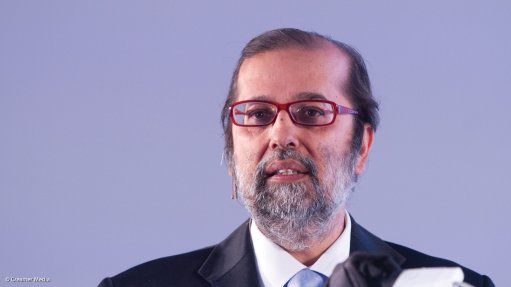
Communications Minister Yunus Carrim
Photo by: Duane Daws
A Green Paper for South Africa’s national integrated information and communications technology (ICT) policy would be gazetted for public comment in early December, Communications Minister Yunus Carrim told the Parliamentary Portfolio Committee on Communications this week.
“The national Integrated ICT Policy Green Paper, with all 12 chapters, has been drafted and is currently being edited and will be presented to the policy review panel on November 5 for final consideration,” he said in his presentation.
This comes as the 22-member panel concluded all the critical research on the frameworks governing telecommunications and information technology, broadcasting, investment and manufacturing, postal services, content development and digitising government.
Carrim said a programme of engagement would be implemented, including provincial hearings, and culminate in a National ICT Forum bringing together government, the industry, trade unions and individual experts from academic and government, as well as civil society role-players during the first quarter of 2014.
The Department of Communications (DoC) previously said a White Paper would be published by March next year after the review panel outlined the scope of work and terms of reference for reviewing South Africa’s current ICT framework.
The panel, which was selected in December by disgraced former Communications Minister Dina Pule, was responsible for determining policy aims and strategies for ICT research and development, human capital development, application-development promotion, manufacturing support, investment in ICT backbone infrastructure and examining trends for digitising government to increase the use of ICT.
Updating the committee on the progress made on the mandates he established in August, after assuming the role of Minister, Carrim reiterated that, until the 2014 election period, he would focus on establishing a more effective DoC, easing tensions and building bridges in a fragmented and fractious ICT sector, finalise several plans and strategies, including the Broadband Policy, Strategy and Plan and the Spectrum Policy, besides others, and kick off the long-awaited digital migration process, besides a number of other issues.
“Since August 20, the DoC has prioritised these areas and made significant progress, we think, in almost all these areas,” Carrim said.
He pointed to the finalisation of the much-revised and long-awaited draft National Broadband Policy, which has been unveiled to participants in the final public consultation in October, prior to its submission to Cabinet for approval in December.
The department would also table a directive on the much-contested set-top box (STB) controls issues that were delaying the roll-out of digital terrestrial television (DTT).
“The facilitation process on STB control began in mid-September. The facilitation team has finalised its report and it is being processed for a Cabinet decision by December 4,” he said.
The STBs will be required to receive a digital terrestrial signal and South Africa has made a commitment to the International Telecommunications Union to migrate from an analogue to a digital signal by the middle of 2015.
To fast-track digital migration, the DoC planned to launch the migration, initially using satellite technology, while the DTT STB control matters were being resolved.
The much-delayed awarding of the tender for the manufacture of five-million subsidised STBs for terrestrial television had been halted until the legal dispute over the granting of conditional access control to DoC-appointed Sentech, instead of broadcasters, between the DoC and free-to-air broadcaster e.tv, was resolved.
The department, State-owned broadcaster, the South African Broadcasting Corporation, and e.tv, besides others, continued with court-ordered talks into the role of each party in the implementation of the conditional access, the continuation of the STB tender and the delivery of the STBs to the market.
In September, Sentech launched the satellite platform Freevision, to serve as the “DTT gap-filler” for the 16% of the population that would not be covered by DTT.
“This satellite platform provides 100% geographical and population coverage. The DoC, in collaboration with its State-owned companies, is currently conducting provincial education road shows to promote the uptake of digital television services provided under the newly launched satellite platform,” Carrim explained.
The DoC was also “in the process of issuing a tender” for subsidised satellite STBs using funding available for the 2013/14 financial year.